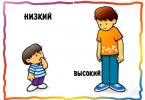Women of aristocratic and samurai families also did not usually be surnames, as they did not have inheritance rights. In cases where the names in women were still, they did not change them when married.
The names were divided into two groups - the names of the aristocrats and the names of Samurai.
Unlike the number of samurai names, the number of the names of the aristocrats almost did not increase from ancient times. Many of them were adjacent to the priest past Japanese aristocracy.
For decades, no, century, Japanese parents were happy, giving their children ordinary japanese names. Of course, there were trends, but the last of them produces children with strange names and even worried about intimidation. Japanese names are slightly different from English. Traditionally, the first names were chosen depending on the amount of brush strokes in the child's last name and based on the Kanji characters used under the first name. Some kandzi are treated as more favorable, based on their meaning.
Girls often considering a simple surname, because their names changed, if they got married, and parents are concerned that sophisticated name With a large number of brush smears, it may not coincide with their new surname. Now many young parents choose "bright names" for their children. These names are based only on how they sound, and Kanji characters do not have much importance, if any. Sometimes people call their children after manga characters or video games - what would be unheard of generation back to Japan.
The most complicated and respected clans of the aristocrats were: Conoe, Takasi, Kudzo, Ihidzo and Godzu. They all belonged to the family of Fujiwara and had a common name - "Gosetsuke". From among men of this kind, Regents (SESSU) and Chancellors (Campak) of Japan were appointed, and from among women - wives were chosen for emperors.
The following are clans of Hirokhate, Diago, Kuga, Oymikado, Sayondi, Sandjo, Imaidagawa, Tokundayji and Kaine. Of their numbers, the highest state dignitaries were appointed. Thus, the representatives of the Saiondi clan served by the imperial stables (mayoro but Gogan). Next, all other aristocratic clans have already followed.
Japanese male names

There were newspaper columns in which intimidation was discussed, and children with unusual names teased. However, the call of these names is to stand out. Parents do not want their children to have the same name as other children. Many names are often found in Japan, so the desire to be different is clear.
Over the years, there have been trends in the title, and these "brilliant names" - just the latest trend. For decades after the war, more and more girls received Kanzi for "Co.", which led to the emergence of many women with such names as "Yoko", "Kyoko" or "Yuko." One of the reasons why "Ko" spread so in these years was the Empress Michiko. Now "Ko" sounds old fashioned for some young Japanese.
The hierarchy of the knowledge of aristocratic genera began to develop in the 6th century and existed until the end of the XI century, when power in the country moved to samurai. Among them, the clans of Genzy (Minamoto), Heike (Taira), Hodzo, Asicaga, Tokugawa, Matsudayra, Hosokawa, Simaja, Oda were used. A number of their representatives in different time were signes (military rulers) of Japan.
Japanese male names and their meaning
After the boom "Ko" more girls began to receive names with MI, which means "beautiful", among other trends. Sincere Trend title is actually closer to how many Americans call their children - they choose the name they consider good. Of course, some people give surnames or check the meaning of the name, but many do not want. People must choose the names that, in their opinion, are good names that children can be proud of. They say parents, the Japanese or somewhere else, name your child Pikachu.
The personal names of aristocrats and high-ranking samurai were formed from two kandzi (hieroglyphs) "noble" meaning.
Personal names Samurai servants and peasants were often given on the principle of "numbering". First Son - Itiro, the second-Dziro, the Third - Saburo, the Fourth - Siro, Fifth - Goro, etc. Also, except for "-ro-", for this purpose, the suffixes "-EMON", "-DZI", "-DZO", "- SUKE", "- BE" were used.
Nevertheless, the Japanese always loved to play with their system language and letters to call people. This, of course, also takes place in countries that offer an even greater share of interpretation freedom. It goes without saying that Naruto is not an exception to the rule.
Uzumaki 渦 巻 \u003d Naruto Tourbillion ナ ル ト \u003d Essential from Nutokaka 鳴 門 巻, culinary decoration based on PSHTET from fish. Please note that on the island of Japan there is a city called Naruto, where you can see the whirlpool in the water. We put the surname before the first name. In this case full name Sakura means "Spring Cherry".
Upon joining a samurai during the day, he chose a different name, rather than what was given to him at birth. Sometimes samurai changed their names and for adulthood, for example, to emphasize the onset of her new period (promotion or relocation to another service place). Mr. possessed the right to renaming his vassal. In the case of a serious illness, the name was sometimes changed to the name of the Buddha Amida to appeal to his grace.
Sasuke サ ス ケ \u003d Comes from the famous Ninja, Sarutobi Sasuke Uchiha. . The way he expresses himself in the manga also comes from the Kabuki. In the legend about Jiraje, Tsunade is his wife. Orochi 大 蛇 Maru. . In the legend about Jiraja Orochimaru is the enemy of Jirai and Tsunadn.
Konoha 木 ノ 葉 \u003d sheet, "hidden leaf village" Maru 丸 \u003d suffix for old Japanese male names. This is a boy from the leaves, the small son of the third hokage of the hidden village of the sheet. Hatake 畑 \u003d Kakashi field カ カ シ \u003d scarecrow. . I "scarecrow in the field" I had problems in seeing the connection with the character.
According to the rules of samurai fights before the fight, Samurai had to call his full name so that the enemy could decide whether he was worthy of such an opponent. Of course, in life this rule was respected much less frequently than in novels and chronicles.
At the end of the names of girls from noble families, suffix "-Hime" was added. It is often translated as a "princess", but in fact it was used in relation to all the notable young ladies.
This is reflected in his combat positions and blood, which he called in his country. "Fangs mound." In the Edo Epoch, Clan Inuzuca was one of the most influential clans in Tiba Prefecture. Yakushi 薬 師 \u003d Cabuto healer 兜 \u003d scarab. . The "scarlet red color of the setting sun", compared to his eyes, undoubtedly.
Why "Dolphin Sea"? 油 目 \u003d literally means "oil eyes" tide 忍 \u003d "Shinobi" radical, it means "tolerate, hide, store a mystery." Rock ロ ッ ク \u003d Rock Lee リ ー \u003d With reference to Bruce Lee. . In Japanese beliefs and beliefs, caressing is a magical animal. In addition, the myth says that if you see or hear his voice, something will happen to you.
For the names of Samurai, the suffix "-dzen" was used. Often they were called simply by the name and rank of her husband. Personal names of married women were practically used only by their close relatives.
For the names of monks and nuns from the noble classes, suffix "-in" was used.
Created in deep antiquity. At the turn of the first millennium, somewhere in three hundred years BC, developed Japanese culture, referred to as experts, rebel reached its apogee. The fundamental modifications of this culture led to the revival of a new one, called today's scientists of Yane. With the advent of Yane and the National Japanese began to form.
Modern men's Japanese names and their importance are determined by the division of society in the Yane era on the ruling top - clans, artisans - those who served these clans, and the lowest estate - slaves. The personality of a person to a particular social category was noted by the component of his name. For example, the "UDGI" component meant that a person has the privileges of the ruler, the BE component is his belonging to the working class. Thus formed whole bodies with names, including "UDI" and "BE". Of course, over time, the social status of the genus changed significantly, along with the name of the name. Now the presence in the name of these components does not determine their position in society, but at least indicates genealogical roots.
It will be a reduction in the proverb, which means "becoming Asura, who loves himself." Gaara would mean something like "pride and war against themselves." . Choosing a child name can be difficult. But if you live in such a country like Japan, it becomes more difficult, because you have to decide how the kanji will be called.
Let's look at the trends that this year were widespread in Japan, and those that disappeared. But before leaving, we must explain the criteria of Japanese names. As we have already mentioned in joining, Japanese parents choose not just a name, they like them, but for their children, but in most cases even kanji that they like most. Therefore, if they choose a name, but they want another kanji, they can do it, as Kanji can write and read in different ways. For this reason, there may be equal names in ratings, but they are written or pronounced in different ways.
On the last name until the XIX century, only exceptional cannas were eligible, close to the emperor. All the rest of Japan's population was content with names and nicknames. The aristocrats were considered elected - "Kuga", and samurai - "beads".
Samurai - the clan, formed in the VII century, when the first military usurper - Segun - Samurai Minamoto, but - Echermoto appeared in the history of Japan. He laid the beginning of the formation of a privileged class called "Samurai". The fall of the Shatkawa sagus and the concentration of power in the hands of Emperor Mutsukhito created the fertile soil for the prosperity of the military clan and consolidate its preferential benefits for many years.
Samurai's names chose themselves respectively. It could be a service place or receiving any awards. Thanks to its special position, they received the right to refer their vassals independently and often gave ordinal numbers to the names of their servants. For example, Itiro is the first son, the pea is the fifth, Siro - the third. Particles "ITI", "GO" and "SI" in these names are ordinal numbers. Men's Japanese names have kept this tention of numbers so far, but now it is no longer wearing so clear instructions on belonging to the category of commoners. Samurai, having achieved a period of youth, received the right to choose a new name for themselves. Sometimes they changed their names several times throughout the life in order to mean any significant dates of the biography. Unhappy servants at the same time also renamed regardless of their desire. What can you do - the owner-barin!
Do parents want their children to travel a lot? Or they fans and want their children to look like the fourth hokage, Minato Namikadze, but it could help fold the word and finally give to understand who will win them. Another "change of this" year is that Rin fell to the sixth place. Last year it was believed that the success of Rin was due to influence, and the fact that Anna was in the sixth place did not confirm this hypothesis.
On an affordable and poetic language, the book Dizaju Suzuki sets out the ideas of Zen and their historical developmentBy tying the birth of Zen with Bucidido, the path of warrior and traditional Japanese arts. He is the author more than a hundred books. "Zen and Japanese culture" are one of the key books about Zen, created in the twentieth century.
It is curious that the samurai severe illness was also the reason for changing the name. Only in this case, an exceptional method of naming was applied - the patient was made by the "Buddha Amida", hoping to appeal to the grace of the Buddha and defeat the disease in the fights traditional for samurai, each of the opponents before the fight announced its full name, in order to enable the opponent to comprehend and analyze His battle qualities. Good custom - to fight anonymously somehow uncomfortable! In fact, the rule was rarely respected. It is probably because of the fights - the event spontaneous, and the opponents simply did not have time left for a closer acquaintance.
It is the main source for anyone who wants to understand the basic ideas of Zen - what is unthinkable without knowing the context of Japanese life and art. It is impossible to talk about Japanese culture, except Buddhism, because at each stage of its development we see the presence of Buddhist mood in one form or another. Indeed, there are no areas of Japanese culture that have not experienced the influence of Buddhism - the effect is so much that we, living in his very center, do not feel it at all. Since it was officially represented in our country, Buddhism has always been the strongest factor in the development of the cultural history of Japan.
Modern Japanese names are many varieties where they certainly have any of the elements that have taken from the ancestors. Men's Japanese names and their importance are still dependent on the sequence number, under which a boy appeared in the family. The suffixes "ITI" and "Kazzu" indicate that it was the firstborn, Dzhi - the second male baby, "Dzo" - the third, etc. In particular, these are the names of Kyuiti, Kenzy, Ken-Dzo. But with the "Sin" particle, the Japanese treated very carefully - in translation, it means "death". A person who was named after such a particle is either doomed to a serious fate or makes the hardest destiny of other people. So, if it happens to get acquainted with the Japanese, in whose behalf there are "Sin", you have to be careful. Itself not wanting, he can bring misfortune.
We can almost argue that the fact of his introduction itself was caused by the desire of the ruling classes of the time to turn Buddhism into the mediator of cultural progress and political consolidation. In any case, Buddhism quickly and inevitably began identifying himself with the state. Although with a purely religious point of view, it is unclear whether this identification was indeed useful for the healthy development of spiritual Buddhism or not, this is a historical fact that Buddhism completely merged with the political power of consecutive governments and helped them in different ways to implement their political intentions.
Some men's Japanese names and their meaning.
Akeno - Clear Morning
Akio - Krasseta
Akira - intelligent, smart
Akiyama - Autumn, Mountain
Amida - Buddha name
Arata - inexperienced
Benjiro - enjoying the world
Botan - Peony
Dai - Great
Daichi - Great First Son
Daiki - Great Tree
Daisuke - Great Help
FUDO - God of Fire and Wisdom
Fujita - Field, Meadow
And since the sources of Japanese culture were generally in the hands of the highest dominant classes, for Buddhism was natural to become aristocratic. If we want to see how much Buddhism entered the history and life of the Japanese, let's imagine that all temples and all the treasures that are stored in them are destroyed. Then we will undoubtedly felt Japan as a gloomy country, despite all its natural beauty and happy people. Then it will look like an empty, abandoned house without furniture, paintings, screens, sculptures, tapestries, gardens, arranged colors, but theater, tea ceremony, etc.
GORO - Fifth Son
Haru - Born in Spring
Hachiro - Eighth Son
Hideaki - brilliant, excellent
Hikaru - Light Shiny
Hiroshi - generous
Hotaka - Mountain name in Japan
Ichiro - First Son
Isami - courage
Jiro - Second Son
Joben - Loving Clean
Jomei - bearing light
JURO - Tenth Son
Kado - Gate
Kanaye - diligent
Kano - God of Water
Katashi - hardness
Katsu - Victory
Katsuo - Victory Child
Katsuro - Victorious Son
Kazuki - Joyful World
Kazuo - Cute Son
Keitaro - Blessed
Ken - Healthy
Ken`IChi - Strong First Son
Kenji - Strong Second Son
Kenshin - sword heart
Kenta - healthy and brave
Kichiro - Lucky Son
Kin - Golden
Kisho - having a head on his shoulders
Kiyoshi - Quiet
Kohaku - Yantar
Kuro - Ninth Son
KYO - consent (or red)
To limit the Zen and its influence on Japanese culture, it is useful to look at some features of Zen Buddhism, which especially attract Japanese soul. Undoubtedly, the Jen philosophy, in general, is the philosophy of Buddhism in the direction of Mahayana, but has its own implementation method. It is in this that immediately see the secret of his own being, which, according to Zen, is the reality itself. Therefore, Zen advises us not to follow the oral or written teachings of the Buddha, do not believe in the existence of the creature above us, and not practicing formulas of ascetic preparation, but to achieve internal experience to be done in the deepest depths of our existence.
Mamoru - Earth
Masa - straightforward (person)
Masakazu - First Son Masa
Mashiro - wide
Michio - a man with a force of three thousand
Miki - St Bellek
Mikio - Three Woven Tree
Minoru - Seed
Montaro - Big Guy
Morio - Forest Boy
Nibori - famous
Nikki - Two Tree
Nikko - Daylight
OSAMU - hardness of the law
Rafu - Network
Raidon - God thunder
Renjiro - honest
Renzo - Third Son
Rinji - Peace Forest
Roka - White Wave Comb
Rokuro - Sixth Son
Ronin - Samurai without a host
RYO - Excellent
Ryoichi - First Son RYO
Ryota - strong (fat)
Ryozo - Third Son RYO
Ryuichi - First Son RYU
Ryuu - Dragon
Zen appeals to an intuitive understanding, which consists of experience, called Japanese satires. Therefore, the importance of the survival of the satir should be considered as something extremely closely associated with the Zen. The principle of Sato argues that it is impossible to rely on ideas to get the truth about things, because ideas are useful in determining the truth, but they do not know us personally. Rational knowledge can make us wise in a sense, but it is superficial wisdom. This is not a live truth, and therefore there is no creativity in it, because it is only the accumulation of dead matter.
Saburo - Third Son
Sachio - Fortunately Born
Saniiro - wonderful
Seiichi - First Son Sei
SEN - Tree Spirit
Shichiro - Seventh Son
Shima - Islander
Shinichi - First Son Shin
Sho - prosperity
Susumi - moving forward (successful)
Tadao - helpful
Takashi - famous
Takehiko - Bamboo Prince
Takeo - like bamboo
Takeshi - bamboo tree or brave
Takumi - Craftsman
Tama - Gemstone
Taro - Firstborn
Teijo - Fair
Tomeo - Careful Man
Torio - Bird Tail
Toru - Sea
Toshiro - Talented
Toya - door at home
In this regard, Zen is only a reflection of the general spirit of east thinking. In words, there is truth that the eastern mind is intuitive, and West is logical and analyzed. The intuitive mind has its weaknesses, however, but his strongest side is revealed when it comes to the most elementary things in life, that is, things related to religion, art and metaphysics. And it is Zen that particularly emphasizes this fact - to Satori. The idea that the ultimate truth of life and things as a whole can be achieved intuitively, and not reason, and that this intuitive understanding is the basis of not only philosophy, but also of all other cultural events, Zen Buddhism contributed to the development of the artistic sense of the Japanese.
UDO - Ginseng
Uyeda - From the rice field (child)
Yasuo - peaceful
Yoshiro - Perfect Son
Yuki - Snow
Yukio - cracked by God
YUU - Noble Blood
YUUDAI - Great Hero




